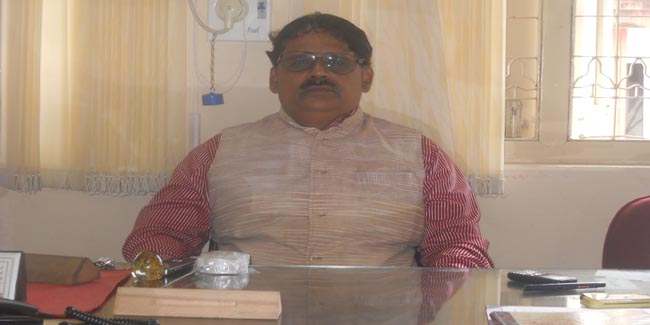Nagpur being the Second Capital of Maharashtra, having tremendous advantages in terms of location, infrastructure, resources, potential for growth and having a Bench of High Court, rightly deserves the establishment of the National Law School. Nagpur has now gone global with the establishment of MIHAN, SEZ Projects and most importantly the Boeing setting up its Maintenance-Repair-Overhaul (MRO) facility.
Nagpur News: Dr S M Rajan, a known name for every citizen in general and a prominent name in legal and social circle in particular, does not need an introduction. But for the sake of reporting, Dr S M Rajan is Director and Principal of the Central India College of Law, Nagpur. Dr Rajan is winner of prestigious awards like “Man of the Year -2004,” Bharat Ratna Dr. B. R . Ambedkar Legal Education National Award of 2012, Mahatma Phule Lifetime Achievement National Award -2013 and the subsequent felicitation by Dr Aziz Qureshi, Governor of Uttarakhand for his outstanding professional achievements and significant contribution in the field of Legal and Social services. Dr Rajan’s lifetime mission is to impart and promote education, and he has been doing it for the past two decades tirelessly and devotionally. Dr Rajan successfully conducted dozens of Free Legal Aid programmes for the benefits of rural’s poor, downtrodden,other weaker sections of society like destitute women, SCs, STs, and minorities. The Nagpur Today felt it privileged to have a talk with him and its scribe Neha Ghanshani went face to face and interviewed him for further information. The following are excerpts of the interview.
Nagpur Today: Why the demand for National Law School in Nagpur?
Dr S M Rajan: Nagpur is emerging as one of the major centres for basic educational facilities owing to the existence of many educational, medical and technological institutes of world class level. The setting of this school will go a long way in adding to the existing educational hub which Nagpur city today enjoys. Nagpur being the Second Capital of Maharashtra, having tremendous advantages in terms of location, infrastructure, resources, potential for growth and having a Bench of High Court, rightly deserves the establishment of the law school. This will greatly add, not only to it’s being an educational centre of repute, but to the further development of this expanding city having a population of over 40 lakhs. Moreover, Nagpur has now gone global with the establishment of MIHAN, SEZ Projects and most importantly the Boeing setting up its Maintenance-Repair-Overhaul (MRO) facility. Many prominent advocates belong to Nagpur and are serving in different courts of the country. The establishment of law school in Nagpur will not only be beneficial to the people of Vidarbha but to the people engaged in legal profession in the adjoining States also.
Nagpur Today: Why there is need to set up National Law Schools?
Dr S M Rajan: The study of law has received the best attraction among high school passers with the introduction 5-year L.L.B integrated programme. Conventional role of lawyers is changing from resolving disputes within court rooms to that of a policy planner, business advisor, mediator, law reformers etc. The lawyer must interact with other professions on equal footing and must be able to relate scientific and technical knowledge. Law curriculum must provide an integrated knowledge of bio-diversity, bio-technology, information technology, environmental sciences, ocean and marine sciences, public health and other related knowledge which have to be imparted to the students of National Law Schools. Law schools produce some of the most talented and dynamic lawyers who are absorbed in the judiciary, public service commissions, academics, law firms and corporate bodies. One of the most important contributions of this culture of legal education by law schools is that many crucial national issues on which the law or the Constitution is silent, have been illuminated, interpreted and applied, enriched by the informed academic debates amongst the students of law schools.
Nagpur Today: What is your perception about the National Law School?
Dr S M Rajan: Over the years, there has been degeneration of academic standard with little scope for innovation in the design of courses, development of the appropriate teaching modules, formulation of research agenda including undertaking of the research project and also promotion of advocacy in layering. The present law colleges in India have been suffering from lack of independence and institutional autonomy as they are within the University system whose priorities did not always match. As a result, the ability to attract talented students with a passionate commitment to study law in all its ramifications dramatically reduced culminating in institutionalized mediocrity in law faculties across the country. The establishment of law schools has successfully challenged this institutionalized mediocrity and succeeded in attracting talented students in law schools. Hence I welcome the concept of law schools in the country.
Nagpur Today: What about the criterion of quality of teachers to be appointed in law schools?
Dr S M Rajan: Top law schools face a very important challenge which prevails even today, i.e in attracting faculty members who are top researchers in the field of law and can combine sound teaching methods with established track records of research. The lack of researchers in law and the absence of due emphasis on research and publication in the existing law schools have led to the absence of an intellectually vibrant environment. We really need enlightened and erudite scholars to teach in the law schools. We should not compromise with the quality in the regards.
Nagpur Today: Any message to the law students?
Dr S M Rajan: Legal education has ceased to be a mere classroom teaching learning process. It has acquired a new meaning in the form of fruitful exchange of legal knowledge and lending a new meaning to one’s own being in this world. Students are not only made legal experts through quality teaching of law, but also transformed into good human beings with social and moral values to relentlessly fight for the rights of downtrodden and underprivileged sections of the society.
…By Neha Ghanshani















